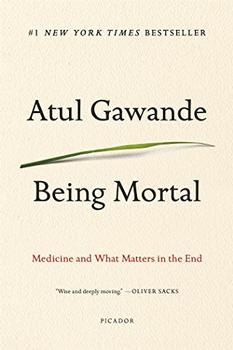Summary | Excerpt | Reading Guide | Discuss | Reviews | Beyond the Book | Readalikes | Genres & Themes | Author Bio

Medicine and What Matters in the End
by Atul Gawande
Now, more than a decade after I first told Mr. Lazaroff's story, what strikes me most is not how bad his decision was but how much we all avoided talking honestly about the choice before him. We had no difficulty explaining the specific dangers of various treatment options, but we never really touched on the reality of his disease. His oncologists, radiation therapists, surgeons, and other doctors had all seen him through months of treatments for a problem that they knew could not be cured. We could never bring ourselves to discuss the larger truth about his condition or the ultimate limits of our capabilities, let alone what might matter most to him as he neared the end of his life. If he was pursuing a delusion, so were we. Here he was in the hospital, partially paralyzed from a cancer that had spread throughout his body. The chances that he could return to anything like the life he had even a few weeks earlier were zero. But admitting this and helping him cope with it seemed beyond us. We offered no acknowledgment or comfort or guidance. We just had another treatment he could undergo. Maybe something very good would result.
We did little better than Ivan Ilyich's primitive nineteenthcentury doctors—worse, actually, given the new forms of physical torture we'd inflicted on our patient. It is enough to make you wonder, who are the primitive ones.
Modern scientific capability has profoundly altered the course of human life. People live longer and better than at any other time in history. But scientific advances have turned the processes of aging and dying into medical experiences, matters to be managed by health care professionals. And we in the medical world have proved alarmingly unprepared for it.
This reality has been largely hidden, as the final phases of life become less familiar to people. As recently as 1945, most deaths occurred in the home. By the 1980s, just 17 percent did. Those who somehow did die at home likely died too suddenly to make it to the hospital—say, from a massive heart attack, stroke, or violent injury—or were too isolated to get somewhere that could provide help. Across not just the United States but also the entire industrialized world, the experience of advanced aging and death has shifted to hospitals and nursing homes.
When I became a doctor, I crossed over to the other side of the hospital doors and, although I had grown up with two doctors for parents, everything I saw was new to me. I had certainly never seen anyone die before and when I did it came as a shock. That wasn't because it made me think of my own mortality. Somehow the concept didn't occur to me, even when I saw people my own age die. I had a white coat on; they had a hospital gown. I couldn't quite picture it the other way round. I could, however, picture my family in their places. I'd seen multiple family members—my wife, my parents, and my children—go through serious, life-threatening illnesses. Even under dire circumstances, medicine had always pulled them through. The shock to me therefore was seeing medicine not pull people through. I knew theoretically that my patients could die, of course, but every actual instance seemed like a violation, as if the rules I thought we were playing by were broken. I don't know what game I thought this was, but in it we always won.
Dying and death confront every new doctor and nurse. The first times, some cry. Some shut down. Some hardly notice. When I saw my first deaths, I was too guarded to cry. But I dreamt about them. I had recurring nightmares in which I'd find my patients' corpses in my house—in my own bed.
"How did he get here?" I'd wonder in panic.
I knew I would be in huge trouble, maybe criminal trouble, if I didn't get the body back to the hospital without getting caught. I'd try to lift it into the back of my car, but it would be too heavy. Or I'd get it in, only to find blood seeping out like black oil until it overflowed the trunk. Or I'd actually get the corpse to the hospital and onto a gurney, and I'd push it down hall after hall, trying and failing to find the room where the person used to be. "Hey!" someone would shout and start chasing me. I'd wake up next to my wife in the dark, clammy and tachycardic. I felt that I'd killed these people. I'd failed.
Death, of course, is not a failure. Death is normal. Death may be the enemy, but it is also the natural order of things. I knew these truths abstractly, but I didn't know them concretely— that they could be truths not just for everyone but also for this person right in front of me, for this person I was responsible for.
Excerpted from Being Mortal by Atul Gawande. Copyright © 2014 by Atul Gawande. Excerpted by permission of Metropolitan Books. All rights reserved. No part of this excerpt may be reproduced or reprinted without permission in writing from the publisher.
Your guide toexceptional books
BookBrowse seeks out and recommends the best in contemporary fiction and nonfiction—books that not only engage and entertain but also deepen our understanding of ourselves and the world around us.